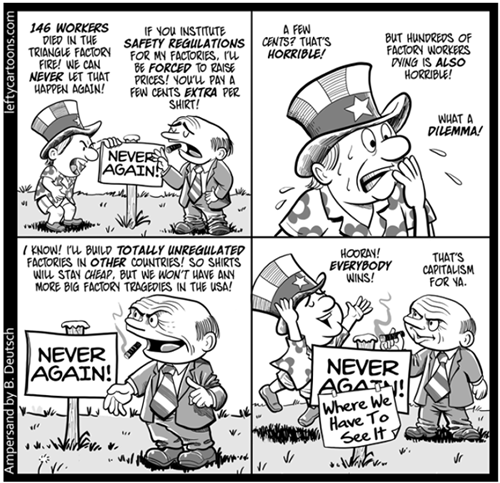
(1) Fix "Our" T: On my walk from Boston's South Station to the D&S office this morning, I encountered an army of people in red "Fix Our T" t-shirts asking commuters to sign a petition to "Fix Our T." (The "T" is Boston's public transit systems, including a subway, buses, and commuter rail.) When I asked one of the petition-wielders what it was all about, she mumbled something about "increasing transparency and accountability." I said that wasn't enough information for me to sign anything, and asked if she had any handouts. (Lots of other people were just signing--people are really fed up with the T, especially after terrible service this winter in the wake of multiple blizzards!) She gave me a flyer which revealed that the petition was to "tell Beacon Hill [the state legislature] to work with Governor Baker and fix our T" and to "to adopt the responsible bipartisan reform proposed by Governor Baker."
It turns out that the website mentioned on these people's t-shirts, www.FixOurT.com, was put up by a group called the Coalition for a World Class public Transit System. It is made up of area chambers of commerce (the North Shore Chamber of Commerce, Metro South Chamber of Commerce, etc.), industry organizations (Massachusetts Lodging Association, Massachusetts Restaurant Association, Massachusetts Petroleum Council (!)), and free-market, pro-business lobbying organizations (the Massachusetts Business Roundtable, Massachusetts Taxpayers Foundation). The list of "solutions" to the T's problems is mostly bland and meaningless, but key items tip their hand as anti-union ("Provide greater accountability and transparency for the T’s governance and management practices to ensure the entity is efficiently and effectively run while employing a productive workforce") and against increased funding for the T ("Ensure that the T balances its operating budget without the need for ever-increasing state assistance each year"). So it's pretty shady to be asking commuters to sign a petition without revealing that this is a big business group with an agenda that many commuters would disagree with. (As my co-editor Alejandro Reuss likes to point out, nobody ever suggests that the military should "balance its operating budget without the need for ever-increasing state assistance each year" they way fiscal conservatives seem to think actual public goods like Social Security, public transit, or USPS should.)
At least the Boston Globe got it right about the petition with this story: Business Groups Lobby in Favor of Baker's MBTA Plan. All these pro-business organizations give the lie to the claim (however technically true) on the group's Facebook page to be a "nonprofit organization," and also makes you wonder what they mean by "Our" T. It reminded me of a Short Run from our April 1975 issue that we republished in our Nov/Dec 2009 35th anniversary issue:
You Make It Work (April 1975)The Reader’s Digest editorial staff is preparing a year-long series of articles defending the U.S. economic system. The Business Roundtable, made up of top executives of 150 major corporations, is paying $1.2 million for the series, which will run under an “[advertisement]” label in each month’s Digest and will be placed in 50 college newspapers as well.The chairman of the Business Roundtable public information committee, which will supervise the series, is Vice President Paul M. Lund of AT&T. The title of the series is surprisingly up front (emphasis added): “OUR Economic System—YOU Make It Work.”
(2) The SEC: Rootstrikers has a new report out about how compromised the current head of the Securities and Exchange Commission is, Mary Jo White, the SEC, and the Revolving Door. It is a great follow-up to Elizabeth Warren's June 2 letter to White criticizing her performance at the SEC, and it is a great riposte to the notion that White would be someone Wall St. wouldn't want to "mess with." From the executive summary:
A deeper dig into White’s career indicates that not only has White’s tenure at the SEC been troubling, it has been a disappointment very much in keeping with her professional track record. Her defenders are right in one very important regard: White has in fact led the SEC exactly as one might expect she would based on her career. White’s career serves as an emblematic example of what is problematic about the revolving door; indeed, she is also a proponent of the revolving door in her hiring and in her personal statements. Her position on the SEC leads to an insolvable dilemma: her lengthy and lucrative ties to Wall Street (Section A below) lead to justifiable calls for frequent recusal, and her frequent recusals (see Section F) lead to frequent deadlock in the commission, preventing adequate enforcement. White’s tendency to hire people for high ranking jobs at the SEC who are likely to avoid stringently enforcing laws protecting society from the dangers of the insiders and large banks for whom they will go to work for next (see Section E) is emblematic of her ideology opposing strong white collar criminal enforcement (see Sections (C) and (D)).
Here's something from Bloomberg Business about the report: SEC Chair’s Conflicts Fuel Sympathy for Wall Street, Group Says.
Meanwhile, Bloomberg Business also reported (here) that the SEC could act as soon as August 5th to (finally) implement a Dodd-Frank rule "that will force public companies to publish a ratio that compares the chief executive officer’s reported pay with that of their typical worker."
What I find hilarious about the resistance to this rule is that corporations, exhibiting that "can't do attitude," have been whining about how much time it would take for them to calculate the pay rate of the "average" worker (with the median pay). But the Stanford University Engineering website has a delightful piece explaining how a doctoral student there, Michael Ohlrogge, figured out a way to do it using statistical sampling:
"You can actually get a very accurate median estimate by sampling as little as one-half of 1 percent of a company's workforce, even for massive multi-national companies," Ohlrogge said.
Ohlrogge submitted several comment letters to the SEC, building his case for statistical sampling. He analyzed legal precedent to argue that, despite there being no specific mention of statistical sampling in Dodd-Frank, the SEC would be justified in using sampling. Then, relying on his engineering skills, he crafted the sampling technique companies could use to estimate median income.
Well done. You can bet, though, that the corporations wouldn't have found it so burdensome to figure out if they thought they could profit from it (vs. the pay ratio promising to expose the ludicrousness of their executives' pay).
(3) TPP: Just two items to pass on about the TPP:
- Dean Baker, Truthout, Victory Over Fast-Track TPP Must Be Cautious of Rich People's Rules. (The rules are: if you lose, you get to do it over and over again until you win. Think TARP.)
- June Zaccone, National Jobs for All Coalition, The Trans Pacific Partnership: A Corporate Wish List. A nice and comprehensive report.
(4) Rana Plaza Victory: To end on an up note: we have been covering the efforts to get clothing retailers whose goods were being made in the Rana Plaza factory that collapsed in Bangladesh on April 24, 2013, in John Miller's articles After Horror, Apologetics, and After Horror, Change? (his columns in our last two Sept/Oct annual labor issues). Finally, change has arrived, as announced by the International Labor Rights Forum:
“This campaign victory would not have been possible without the hard work of workers’ rights groups and labor unions on the ground in Bangladesh, and activism from a wide array of allies around the world who held more than a hundred store actions and demonstrations at corporate headquarters,” said Judy Gearhart, Executive Director of the International Labor Rights Forum.
Maybe we're overcoming the dynamic Barry Deutsch documented in his cartoon for our March/April 2014 issue:

That's it for now.
